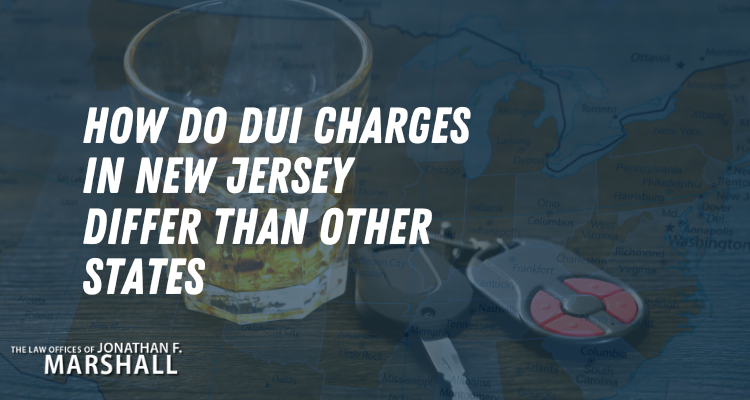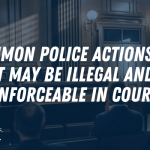 Driving under the influence (DUI) is a serious offense across the United States, but the way it is handled varies significantly from state to state. How do DUI charges in New Jersey differ than other states? New Jersey stands out for its unique approach to DUI charges, with laws and penalties that differ in key ways from those in other states. If you are charged with a DUI in the state of New Jersey, it is important to understand how the justice system handles DUI cases and to speak with a drunk driving lawyer as soon as possible to make sure your rights are protected.
Driving under the influence (DUI) is a serious offense across the United States, but the way it is handled varies significantly from state to state. How do DUI charges in New Jersey differ than other states? New Jersey stands out for its unique approach to DUI charges, with laws and penalties that differ in key ways from those in other states. If you are charged with a DUI in the state of New Jersey, it is important to understand how the justice system handles DUI cases and to speak with a drunk driving lawyer as soon as possible to make sure your rights are protected.
DUI as a Traffic Violation, Not a Criminal Offense in NJ
One of the most notable differences in New Jersey is that DUI is classified as a traffic violation rather than a criminal offense. In many other states, a DUI is treated as a misdemeanor or even a felony, depending on the circumstances. This distinction in New Jersey means that individuals charged with DUI will not have a criminal record if convicted. However, this does not mean the consequences are less severe; in fact, the state imposes strict penalties to deter impaired driving.
Strict Penalties and No Plea Bargaining in DUI Cases in NJ
New Jersey has some of the strictest DUI penalties in the country. How strict is NJ for DUIs? A first-time offender can face fines ranging from $250 to $400, a license suspension of three months, and mandatory participation in the Intoxicated Driver Resource Center (IDRC) program. Repeat offenders face even harsher penalties, including longer license suspensions, higher fines, and potential jail time.
Unlike many other states, New Jersey does not allow plea bargaining in DUI cases in NJ. Known as the “no plea bargain policy,” this rule prohibits reducing a DUI charge to a lesser offense, such as reckless driving. This policy underscores the state’s commitment to treating DUI offenses seriously and holding offenders accountable. As a result, understanding how plea bargaining in DUI cases in NJ differs from other states is essential for anyone facing charges, as it can significantly impact legal strategies.
The Use of the Alcotest Device
New Jersey primarily uses the Alcotest 7110 device to measure blood alcohol concentration (BAC) in DUI cases. While other states may use a variety of breathalyzer devices, New Jersey’s reliance on this specific device has led to numerous legal challenges and controversies. Defense attorneys often scrutinize the calibration and maintenance records of the Alcotest device to ensure accuracy, as any discrepancies can impact the outcome of a case.
Implied Consent and Refusal Penalties: How Strict Is NJ for DUIs?
Like all states, New Jersey has an implied consent law, which means that drivers automatically agree to submit to chemical testing (breath, blood, or urine) when suspected of DUI. Refusing to take a breath test in New Jersey carries its own set of penalties, separate from those for a DUI conviction. For a first-refusal offense, drivers face a license suspension of seven months to one year and fines ranging from $300 to $500. These penalties are often more severe than the consequences for a first-time DUI conviction, highlighting how strict NJ is for DUIs and the state’s emphasis on compliance with testing requirements.
No Hardship Licenses
Another key difference in New Jersey is the absence of hardship or restricted licenses. In many states, individuals convicted of DUI can apply for a hardship license, allowing them to drive to work, school, or medical appointments during their license suspension period. New Jersey does not offer this option, which can create significant challenges for those who rely on driving as part of their daily lives. This policy reflects the state’s stringent stance on impaired driving and its efforts to prioritize public safety.
Ignition Interlock Requirements
For certain DUI convictions, New Jersey requires the installation of an ignition interlock device (IID). This device prevents a vehicle from starting unless the driver provides a breath sample with a BAC below a specified threshold. First-time offenders with a BAC of 0.15% or higher, as well as all repeat offenders, must install an IID at their own expense. Other states may have different thresholds or requirements for IID installation, but New Jersey’s rules are particularly strict in this regard.
The Importance of an Experienced DUI Lawyer in New Jersey
While DUI laws share common goals of deterring impaired driving and ensuring public safety, the specifics can vary widely by state. How do DUI charges in New Jersey differ than other states?New Jersey’s classification of DUI as a traffic violation, its no plea bargain policy, and the absence of hardship licenses set it apart from many other states. For anyone facing a DUI charge in New Jersey, it is of the utmost importance that you speak with a highly-skilled DUI attorney who understands the nuances of New Jersey’s DUI laws and will do all they can to mitigate potential consequences. Additionally, understanding plea bargaining in DUI cases in NJ and other legal nuances can make a significant difference in navigating the strict penalties.



